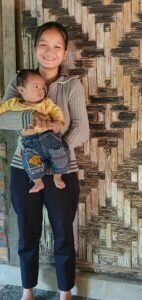ProLiteracy’s international partner Non-Timber Forest Products (NTFP) in Cambodia empowers and equips ethnic minorities to have a better future and livelihood. The Kavet Literacy Project serves 2,000 people, teaching literacy in mother tongue and national language. Each village constructs a hut or makeshift classroom to serve as the community learning center. Volunteer teachers train learners as they advance in their literacy skills to then become teachers in their villages. Today, we highlight Teacher Beng Sawete (known as Wete), who became a literacy instructor by age 13, finished high school, and now works with NTFP helping fulfill the organization’s mission by developing materials for its Kavet Bilingual Literacy Program.
Wete’s story
 Since the age of 9, when Wete entered literacy classes in the Ratanakiri Province of northeast Cambodia, she has been inspired to pursue education.
Since the age of 9, when Wete entered literacy classes in the Ratanakiri Province of northeast Cambodia, she has been inspired to pursue education.
“I wanted to learn to read because I saw the other village teachers, and I was motived to learn so that I could also become a teacher,” she said.
Wete learned to read well within one year of entering an NTFP literacy class, and at age 10 she started primary school. She was placed directly in the fourth grade and continued her literacy studies in the evenings.
“We see clearly that those who attend literacy class learn to read and then excel in [public] school, if they choose to go,” she said.
Like most children of the area, Wete had chores and was responsible for caring for the family’s buffaloes and pigs each day. When her chores were done, she would make the half-hour journey through the mud to class but often there was no teacher.
“It was frustrating to go all the way to class and find no teacher,” Wete said. “When I was 12, I decided that if I was serious about getting an education, I had to commute to the school district center, Veun Sai.”
Serious About Learning
The only girl, Wete went with two boys each morning at 5 a.m. on a two-hour bike trip to the Veun Sai district on the other side of the river. There, with her strong foundation in reading, she was placed in the sixth grade.
In 2012, like her mother and brother and sister had done before her, Wete became a literacy instructor.
“I loved teaching. I was only 13 years old when I started teaching literacy class. I was really young. … I went straight from being a literacy student to becoming a teacher,” said Wete, now 22.
Even at 13, she understood that teaching people in her community to read would empower them. By learning to read in Kavet, a language they already understand, it would be easier to learn the national language of Khmer. With that, she said the Kavet people could learn to speak and read Khmer, and at the market would be able to negotiate fair prices without being tricked.
“I wanted to help my ethnic minority community. Education is a way out of poverty and allows you to get the tools that you need to avoid being taken advantage of.”
“I wanted to help my ethnic minority community. Education is a way out of poverty and allows you to get the tools that you need to avoid being taken advantage of,” she said.
For seven years Wete taught literacy in the evenings while commuting to the district school during the day. Halfway through 10th grade, she made the decision to stop school to work as an intern for NTFP, which she saw as a path to achieving her dream of a job in education. Upon being hired by NTFP, Wete went back to finish school on the weekends.
“I was among the first girls of our ethnic group to ever get so high in the education system,” Wete said. “In December 2021, I was one of two girls to finish grade 12; the first ever Kavet girls to finish high school.”
Wete now develops education materials for NFTP’s Bilingual Literacy Program and trains tutors. She wants to encourage other young people to make education a priority. Children often labor in the fields all day and may not be able to make it to literacy classes. Girls get married very early and suffer health consequences of bearing children at a young age. Meany leave literacy classes by age 14. Boys face the challenge of helping their parents earn a living and then supporting a young wife.
In these circumstances, youth must be very determined to achieve literacy and education.
“[When] a girl goes to school, she delays marriage until 17 or older,” said Wete, who married at 19 and now has a child of her own. “The older she is when she marries, the easier it is for her to raise her children and to avoid health issues.”
She will also be more empowered and capable of a better livelihood, which fulfills NTFP’s mission.